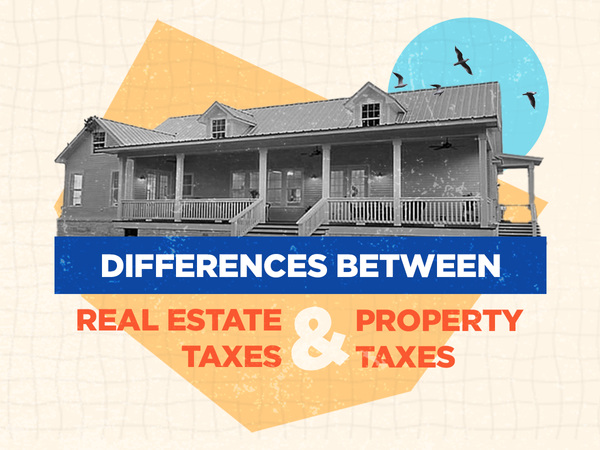When the time comes to pay your taxes, you will probably hear or see a lot of terms being thrown around. This might get confusing, as many of them are used interchangeably. For example, real estate taxes and property taxes – what’s the difference between the two? There’s also a personal property tax that you may need to pay. So are you paying for the same thing or are these separate taxes? It’s quite simple, actually – while “real estate” and “property” taxes are used synonymously, they’re slightly different from one another. “Personal property tax” on the other hand, is a kind of property tax. Let’s get into a more detailed explanation of these terms.
Real Estate Tax
When you own a property, like a home, homestead, or a condo, there are taxes that need to be paid. The annual taxes levied against the value of that property are called real estate taxes. Remember, in Texas, real estate taxes are set by the local or county governments and not the state of Texas itself. If you want to find out what your real estate tax for the year is, you can reach out to real estate experts or your local tax office.
Real estate tax is paid on immovable property, a plot, building or land. This means that the property being assessed for tax purposes is one that can’t be moved. The local government uses the taxes generated from real estate to take care of essential services within its jurisdiction. Some essential services include improvements on infrastructure, schools, security within the county and safety of the citizens.
Real estate taxes are calculated on the basis of the assessed value of your property. In October of every year, the appraisal district of your county mails out the property tax bills due for every homeowner. These bills need to be paid by the 31st of January the following year, or you will be subject to penalties or fines.
Real Estate Taxes vs. Property Taxes
Although real estate and property taxes are terms used in a similar way, there is a subtle difference between the two. Property tax is a term that can be used for any movable or immovable object, such as a car or a home. Real estate tax is used to refer exclusively to the tax amount associated with your home or place of residence, that is, a residence that is immovable. Property tax is a more general term than real estate tax.
A subset of property taxes, for example, is the personal property tax. This is the tax owners need to pay on movable objects, such as boats, planes, RVs, and so on. To put it simply, property tax is more of an umbrella term used to refer to a variety of taxes that can be charged on anything you own, be it movable or immovable. Real estate taxes, on the other hand, refer exclusively to the taxes you pay on immovable property that you own, like a home, homestead or land.
The real difference between real estate and property taxes is the different assets on which they are charged. While the former is charged on immovable assets, the latter is charged on movable assets.
How much are the real estate taxes in Texas?
While the state of Texas itself does not charge any tax on real estate, they assign the taxing responsibility to the local or county governments to charge residents with the appropriate taxes based on their property valuation. How do they come to this amount? Assessors base their understanding on different aspects of the property, such as the location, the amenities available and the condition of the property in order to assign an assessed value. A percentage is charged on this assessed value each year, which is what you need to pay as property taxes.
Here’s a fun fact though, when you’re paying your real estate taxes, there are certain exemptions you can receive. For instance, in some parts of Texas, property owners who own a homestead and are over 65 years old need not pay the entire tax being charged. You should find out the homestead exemptions in your county before paying your property taxes!
Another aspect of real estate taxes is that in some states, like Texas, you can file a protest against the appraisal district’s assessment of your property if you feel that the amount being charged is unfairly high. Make sure you speak to a reliable real estate tax agent who specializes in Texas before you agree with the taxes you have to pay.
Understanding the taxes you pay is crucial to paying your fair share, and saving your hard-earned money. After all, if you were buying property, you wouldn’t be okay paying more than the fair market value, right? However, you would only be able to do so if you knew what the fair market value was to begin with. Similarly, you must be aware of what a fair assessment of your property is if you want to know that you’re paying the right amount in real estate taxes.
Texas is one of the 12 non-disclosure states in the United States of America, meaning that they don’t allow the sale prices of properties to be available in the public record. In order to find out the comparative prices of similar properties and assess your property value correctly, you must get in touch with a reliable real estate establishment like Bezit! They will ensure that the process is simple and straightforward for you. I hope this explains all you need to know about the subtle but important differences between real estate taxes and property taxes. To learn more about real estate taxes in Texas, you can read any of the multiple resources available online.

